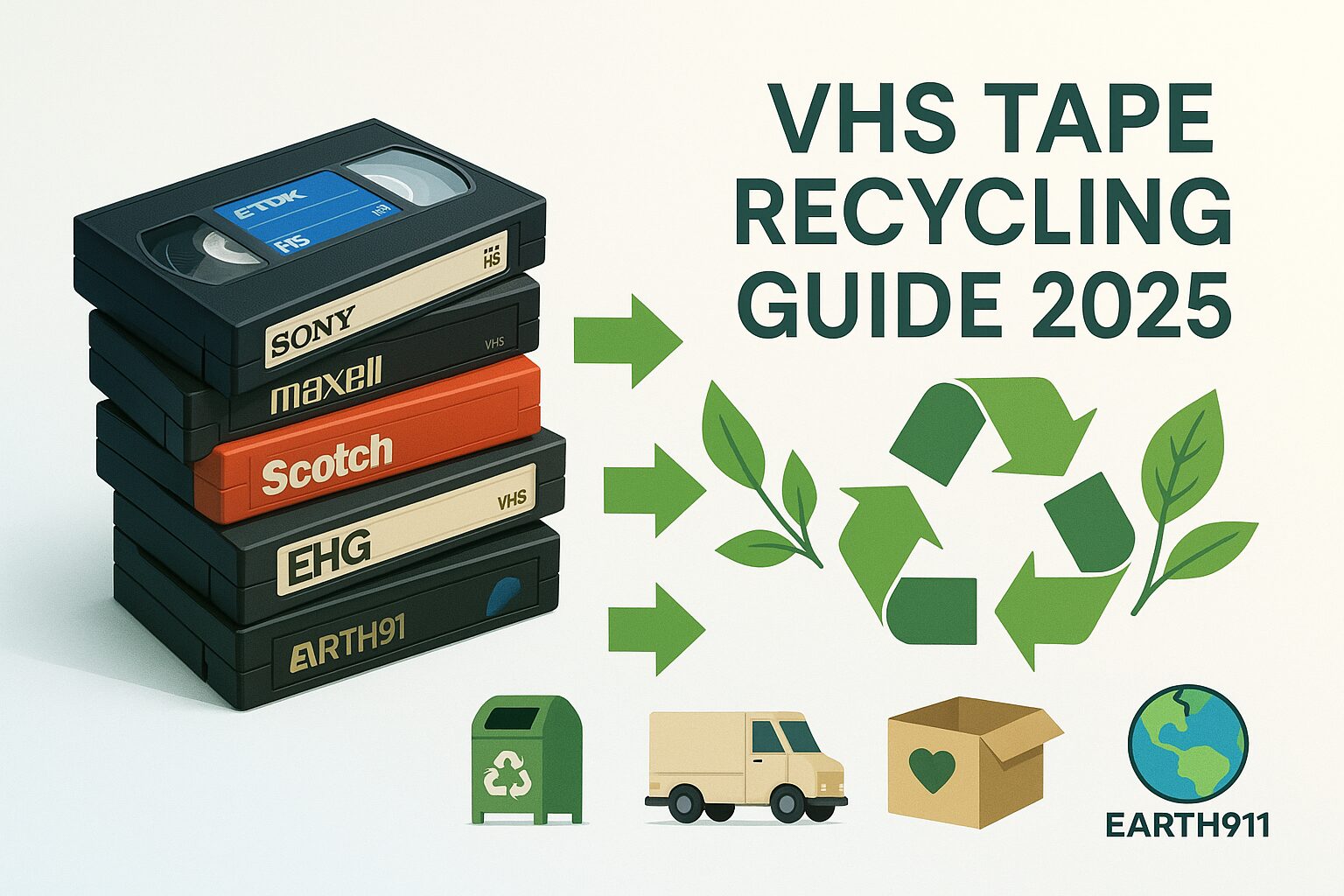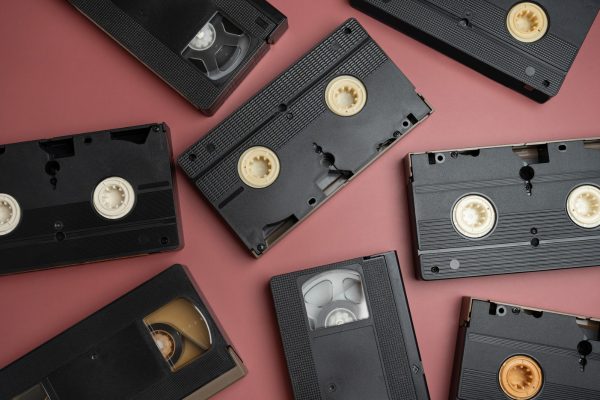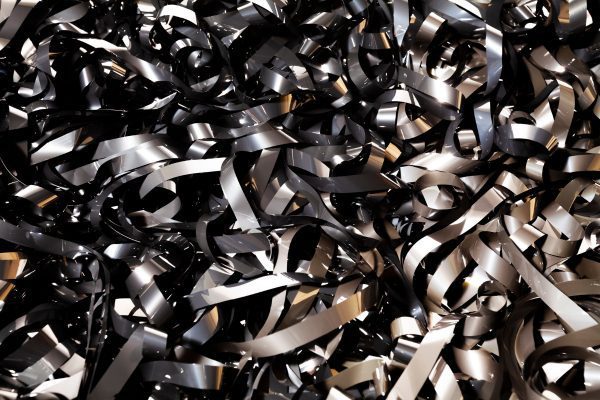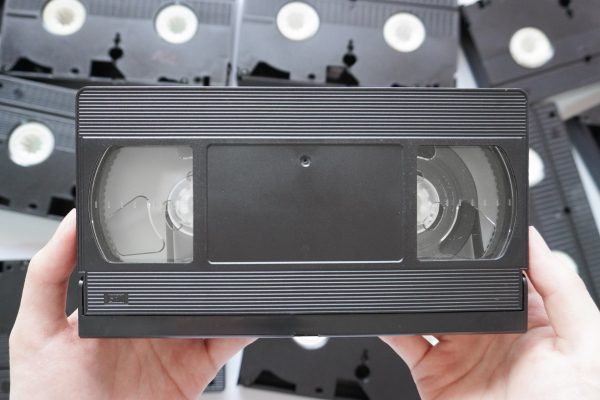

Those dusty VHS tapes in your closet contain toxic metals that shouldn’t end up in landfills. Each tape holds 1,410 feet of magnetic ribbon coated with chromium and iron oxide—materials that can leach into soil and groundwater if improperly disposed.
Finding where to recycle VHS tapes near me poses a real challenge since most curbside recycling programs won’t accept them. Unlike plastic bottles or cardboard, VHS tape recycling requires specialized facilities equipped to handle electronic waste safely.
Here’s your immediate solution: Use Earth911’s recycling search tool or call 1-800-CLEANUP to find local drop-off locations. Most Goodwill stores accept VHS donations, and many communities host free e-waste collection events quarterly. For those wondering what to do with VHS tapes, mail-in services like GreenDisk provide convenient nationwide coverage.
This guide reveals 7 proven methods to recycle VHS tapes locally, includes a cost comparison chart for all options, and explains eco-friendly alternatives to disposal. You’ll discover exactly how to dispose of VHS tapes responsibly while potentially saving money or even earning cash from valuable titles.

When searching for “vhs tape recycling near me,” these resources connect you with local facilities within minutes:
Earth911 maintains North America’s most extensive recycling database with over 100,000 listings. Simply enter “VHS tapes” and your ZIP code on their search platform to find verified recycling centers. The tool displays:
Pro tip: Call ahead to confirm VHS acceptance, as policies change frequently. Some locations that accept general e-waste may not take magnetic media specifically.
These toll-free numbers provide instant access to recycling information:
Many hotline operators can schedule pickups for large VHS collections or direct you to upcoming collection events.
Most cities host quarterly or annual e-waste collection events where you can dispose of VHS tapes for free. Access your local schedule through:
Collection events typically occur during Earth Day (April), spring cleaning campaigns, and pre-holiday seasons.
Quick Reference Table: VHS Recycling Options by Distance
| Distance | Option | Average Cost | Best For |
| 0-5 miles | Local thrift stores | Free (donation) | Working tapes |
| 5-15 miles | Municipal drop-off | Free-$10 | Any condition |
| 15-30 miles | E-waste centers | $5-20 | Large quantities |
| Any distance | Mail-in services | $30-70 | No local options |

Understanding why VHS tapes require special handling helps explain the limited disposal options.
Are VHS tapes recyclable through standard programs? No, due to their complex composition:
These mixed materials make mechanical separation difficult and contaminate standard plastic recycling streams. The EPA classifies VHS tapes as electronic waste requiring specialized processing.
When people ask “is it okay to throw old VHS tapes into the trash,” the answer is a resounding no. Research indicates:
One VHS tape may seem insignificant, but Americans generated an estimated 170,000 tons of VHS waste between 2000-2020.
Twenty-five states plus Washington D.C. have enacted e-waste legislation affecting how to dispose of cassette tapes properly and VHS media:
Check your state’s environmental department website for current regulations. Violations typically result in warnings before fines, but proper disposal remains a legal and ethical obligation.
Here’s every verified method to recycle VHS tapes, ranked by convenience and cost-effectiveness:
Dedicated e-waste facilities offer the most reliable year-round option for VHS tape recycling. These centers typically:
Find certified facilities through R2 Solutions or e-Stewards directories. Both certifications ensure responsible recycling practices and data security.
The most cost-effective solution for where to recycle VHS tapes is municipal collection days. These events:
Sign up for alerts through your city’s waste management portal. Popular collection periods include National Recycling Week (November) and America Recycles Day (November 15).
Retail acceptance has shifted significantly. Current policies:
ACCEPTS VHS (verified 2025):
DOES NOT ACCEPT:
Always call before driving to confirm current policies.
Three major services dominate VHS mail-in recycling:
GreenDisk Technotrash
TerraCycle Zero Waste Box
GreenCitizen Mail-In
Several organizations actively seek VHS donations for reuse:
The Internet Archive specifically requests rare or regional content for digitization projects.
Regional specialists often provide better rates for locals:
Northeast:
Southeast:
Midwest:
West Coast:

Artists and educators transform VHS components into new products:
These centers typically accept any quantity and provide tax receipts for donations.
Cost Comparison Chart: All VHS Recycling Methods
| Method | Average Cost | Turnaround | Pros | Cons |
| Municipal Events | Free | Quarterly | No cost, certified | Limited dates |
| E-Waste Centers | $5-20 | Immediate | Always available | Fees vary |
| Donation | Free | Immediate | Tax deduction | Must be working |
| Mail-In Services | $35-89 | 2-3 weeks | Convenient | Shipping costs |
| Creative Reuse | Free | Immediate | Supports arts | Limited locations |
| Retail Programs | Free | Immediate | While shopping | Few accept VHS |
| Specialty Recyclers | Varies | 1 week | May pay you | Regional only |
Before recycling, consider donation to extend the life of working tapes.
Not all thrift stores accept VHS anymore. Confirmed acceptors include:
National Chains:
Regional/Local:
Call ahead with your tape count—stores may limit large donations.
These institutions often need educational or entertainment content:
Contact through school district donation coordinators or directly through facility managers.
Active communities where you can donate or sell rare tapes:
Rare horror, unreleased films, and tapes with original commercials command premium interest.
Proper preparation ensures safe disposal and protects personal information.
For home videos or sensitive recordings:
Never dispose of unprotected personal recordings—identity theft risk exists even from old tapes.
Preserve content before recycling through:
DIY Methods:
Professional Services:
Most services return original tapes after conversion, allowing you to recycle afterward.
For 50+ tapes, maximize efficiency:
Large collections may negotiate better rates with commercial recyclers—ask about volume discounts.
When local options fail, mail-in services provide nationwide VHS tape recycling solutions.
GreenDisk pioneered mail-in media recycling since 1993:
Service Details:
Process:
Pros: Established company, includes other e-waste, data destruction included Cons: Higher cost for small quantities
TerraCycle specializes in hard-to-recycle materials:
Service Options:
What’s unique:
Best for: Pure VHS/cassette collections without mixed electronics
California-based with national mail service:
Pricing Structure:
Advantages:
Service Comparison Table: Mail-In VHS Recycling
| Service | Best Price | Shipping | Data Destruction | Other E-Waste | Certificate |
| GreenDisk | $35 for 25 lbs | Included | Included | Yes | Yes |
| TerraCycle | $89 for small box | Included | Standard | No | Yes |
| GreenCitizen | $6/lb + shipping | You pay | +$20/unit | Yes | Yes |
Creative alternatives to traditional recycling can give tapes new life.
Popular upcycling projects include:
Tape Ribbon Crafts:
Case Projects:
Whole Tape Uses:
Pinterest and YouTube offer thousands of tutorials for VHS crafts.
For crafting or separating materials:
Safety notes: Wear gloves, work in ventilated area, keep tape away from electronics (magnetic field).
Check these indicators of value:
High-Value Categories:
Where to check values:
Even common tapes might fetch $1-5 in bulk lots to collectors.
Avoid these errors to ensure proper disposal:
Why it’s wrong: VHS tapes contaminate plastic recycling streams and damage sorting equipment. The mixed materials cannot be processed by standard recycling facilities.
Consequences:
Right approach: Always use specialized e-waste recycling channels for how to recycle VHS tapes properly.
Common scenario: Assuming Best Buy or Staples still accepts VHS because they take other electronics.
Reality in 2025:
Solution: Always call ahead and speak to customer service or recycling department directly. Get the name of who confirmed acceptance.
Risk factors:
Protection methods:
No, VHS tapes cannot go in standard recycling bins. The mixed materials—plastic casing, metal parts, and magnetic tape coated with heavy metals—contaminate recycling streams and damage processing equipment. Always use specialized e-waste recycling to properly dispose of VHS tapes.
No, Best Buy does not accept VHS tapes for recycling as of 2025. While they maintain an extensive electronics recycling program for TVs, computers, and cables, magnetic media like VHS and cassette tapes are specifically excluded. They do, however, accept VCR players.
Costs vary by method:
Many facilities offer free drop-off days monthly or quarterly.
While not classified as household hazardous waste by federal standards, VHS tapes contain materials requiring special handling. The magnetic tape includes chromium, iron oxide, and other heavy metals that can leach into groundwater. Many states classify them as e-waste requiring proper recycling channels.
During professional recycling:
Certified recyclers provide detailed tracking of the entire process.
While legally allowed in many areas, it’s environmentally irresponsible to trash VHS tapes. They’ll persist in landfills for centuries while releasing toxins. The question “is it okay to throw old VHS tapes into the trash” has a clear answer: always choose recycling or donation instead. In 25+ states, e-waste disposal in trash is illegal with fines up to $1,000.
You now have seven proven methods to recycle VHS tapes locally, from free municipal drop-offs to convenient mail-in services. The easiest first step? Visit Earth911’s recycling search or call 1-800-CLEANUP to find the nearest drop-off location for vhs tape recycling near me.
For those wondering what to do with VHS tapes, remember that donation extends their useful life while recycling recovers valuable materials. Whether you choose Goodwill donation, municipal e-waste events, or professional services like GreenDisk, you’re preventing toxic materials from polluting landfills for the next thousand years.
Take action today: Sort your collection, protect personal recordings, and choose the recycling method that fits your location and budget. Every tape recycled properly is one less contributing to the 170,000 tons of magnetic media waste. Your obsolete entertainment can become tomorrow’s recycled materials—but only if you act now.
